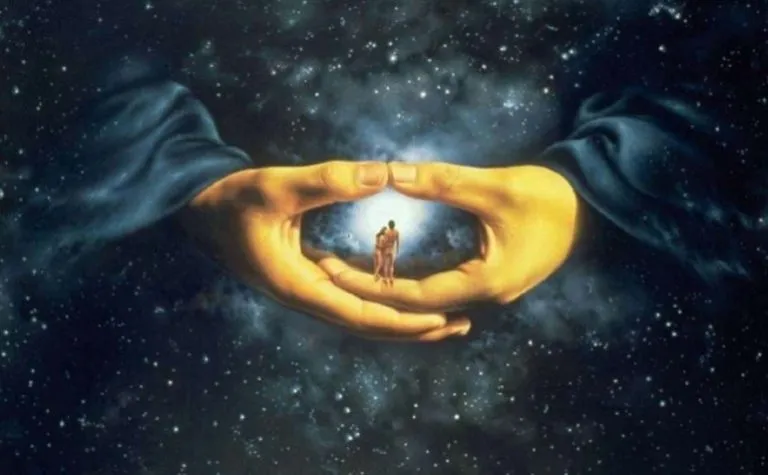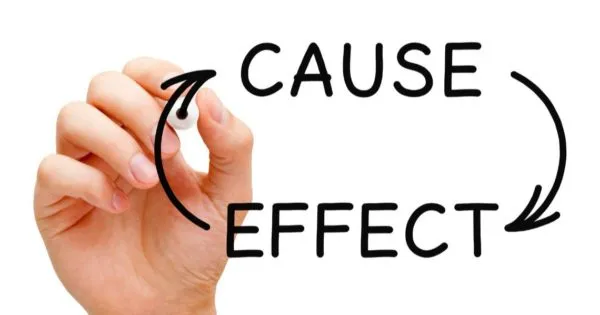When we were little kids, our favorite question was "Why?". We were curious about everything, questions constantly flashed in our head and we were immediately looked for answers. We wanted to know why..
"Why does the water boiling? Why is the snow white? Why doesn't the airplane fall? Why do the hands of the clock go clockwise instead of counterclockwise?"

As we grew older, the questions became more serious, and the answers were fewer and fewer. Partly because many of the answers have already been found, partly because we stop looking for them. Because we resign ourselves to the fact that some questions simply aren't answered.
Who determines our destiny? Is our life the sum total of our own decisions and actions? Do we make our own choices, or does each of our actions have some root cause?
Is it true that God or the universe controls our destiny, and we cannot change anything and do only what is destined. As the Bible says - “The heart of man plans his way, but the LORD establishes his steps”(Proverbs 16: 9 ESV).
Do we deserve our own destiny or does it drop out to us like a random card from the deck?
Could we have avoided those fatal mistakes in the past that have radically changed our lives? Or did we do what we had to do?
Are we the cause of everything that happens to us? Or are we content only with the consequences of the cycle of spiritual and physical processes taking place in the world?
The vast majority of people support the idea of determinism (from Lat. Determinare - "to limit, delineate, define") - the doctrine of universal causality, the interconnectedness and mutual determinacy of all phenomena and processes.
According to it, everything that happens in the world, including the course of history and human life, is predetermined. The philosophical theories of determinism assert that reality follows a predetermined path, and that each moment of the present, in which the world resides, derives entirely from the preceding one. And there is only one, precisely defined possible future.
And we can control that which governs us and which, in turn, guides us. But as psychologist Rollo May said, " Any extension of freedom gives rise to a new determinism, and every extension of determinism gives rise to a new freedom.
There are different attitudes to the causal relationships of phenomena and events.
We are the masters of our destiny (anthropological-ethical determinism)
Most of us reject the notion that we are destined to live predetermined lives-in contrast, we believe that everything is determined by our will and our actions, and that we have the most direct influence on our present and future.
To assume the development of the situation in the future, people try to grasp the relationship between cause and effect based on previous personal experience and acquired knowledge. They use goal-setting, planning, self-control, and other ways of personal development to chart their destiny as thoroughly as possible.
These are people who believe in all sorts of options - the "domino principle"(a change entails a linear series of other changes), the "butterfly effect"(a small effect on a system can have large and unpredictable consequences, including in a completely different place), correlation(a statistical relationship between two or more random variables) and other logical ways of explaining ongoing events and changes.
Fatalism (or predestination)
The opposite of them is the doctrine of fatalism (from Lat. Fatalis "determined by fate") - the belief in the predetermination of being; a worldview based on the conviction of the inevitability of events that have already fixed in advance and only"appear" as the originally inherent properties of this space. (Wikipedia)
One of the most famous followers of this worldview was the ancient Romans, the Stoics. The Stoics took for granted that they had a predetermined destiny and ruled out free choice and chance.
One way to preserve serenity, the Stoics believed, was to take a fatalistic stance toward what was happening. According to Seneca, you need to surrender to fate, because "a great consolation is to know that you are dragged along with the entire Universe" (Seneca. "On Providence" V8). Marcus Aurelius believed that "a good man will accept fate and what is measured out to him."
Unlimited reliance on God or a higher power (theological determinism)
A theological system that views human actions as those that are conditioned by the will of God. Acceptance of God as the supreme all-knowing and all-powerful force who directs the human created by Him . A religious commitment to the will of God. Believers say, "All is the will of God».

Everything that happens is explained by the sovereign nature of God. And what can happen, or has already happened, cannot be explained. «Oh, the depth of the riches and wisdom and knowledge of God! How unsearchable are his judgments and how inscrutable his ways!»(Rom.11:33 ESV) - expresses the unpredictability of life, the impossibility of foreseeing all the turns of fate, known only to God.
I've tried all of these approaches in my life.
I tried to completely control my life, but I often acted stupid and irrational things for no apparent reason. I was disappointed in life, not finding meaning in it, and letting things go «on their own». I selflessly gave myself up to trust in God, His will and grace, but sometimes God's silence drove me crazy..
And I came to the conclusion that this is only partly true.
In part, we ourselves can control what happens to us.
Partly, some force beyond our control determines our lives.
And sometimes reality is absolutely indifferent to us. And then there are accidents and coincidences.
We ourselves determine our place in this chain. And we can be both cause and effect.
Often it seems to us that we are a consequence of someone's will, someone's actions and relationships. But in fact, for ourselves we are the cause of our condition.
For if we cannot choose what happens to us, we can always choose our attitude toward it. After all, our life is not what happens in it, but what we think of it, what we consider it to be.
Everything in this world is interconnected and intertwined. And we do not have power over everything, nor can we comprehend everything. We cannot foresee what the results of our actions will be in the future, because they appear after they have been taken. We cannot know if we are making the right decision.
For example, the protagonist of the famous movie "Butterfly Effect" Evan had the ability to move through time and change the present, changing something in the past. Only that every time Evan tried to fix something, it didn't turn out the way he had planned, and the new reality turned out to be no better than the original one.
And you can spend your whole life "racking your brains," figuring out all kinds of circumstances and consequences of what happened. Or you can simply change your attitude toward the situation today, right now. By directing your attention not to the question, "WHY is this happening to me? Who did this to me?" but rather to the question - "WHAT should I do about what is happening to me?".
And then, if you change your attitude toward the cause, the effect will change as well.

If you have been suffering from guilt for a long time, you can change that. You will have no reason to blame yourself for the past if you realize that you simply could not have acted differently at the time.
If you've been feeling resentment toward someone for years, you can change that. You will have no reason to be resentful when you realize that no one in this world owes you anything.
Our greatest gift is freedom of choice. You can change your mind at any time.
And I believe that by using our the free will given to us, we can live our lives fully and happily, accepting all its unpredictability and inscrutability.
Be as simple as children
We adults think too much. We want to know and understand everything.
We are looking for the secret meaning of our life. We are trying to understand the reasons for the tragic events of of our past. We are looking for a reason to do what we want in the present. We choose a reason in the future to set goals and achieve them.
We look for a reason in the mind so that we do what our heart wants us to do.
Children look at the world differently. At an early age they still retain a remarkable integrity of mind, heart and will, they are characterized by simplicity, spontaneity, a special realism of the soul. Mastering the world around them, they immediately create something new, perceiving his their fantasy no less real than the world around them. Harmony in the child's soul allows him to see and create harmony around him.
Positive faith for children is a natural part of their lives. Children are sure that whatever is done is for the best.
Children don't need a "reason" to be happy.
So let us be as simple as children.
